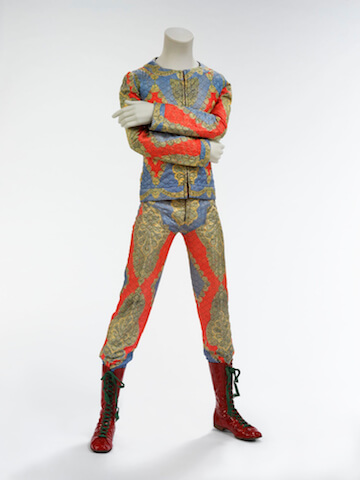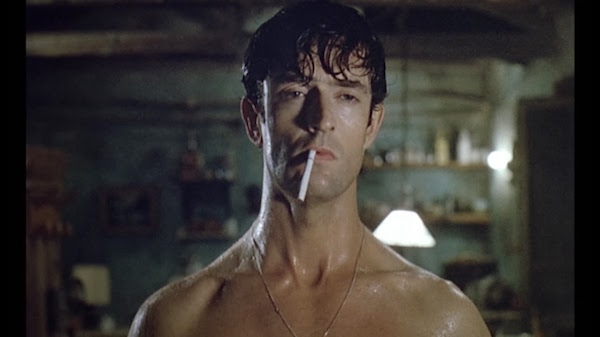When St. Vincent named her second album, “Actor,” she was telling us something. While working under a pseudonym (her real name is Annie Clark) isn’t so meaningful in itself, she refuses to be pinned down. Despite very public relationships with actress Cara Delevigne and Sleater-Kinney guitarist Carrie Brownstein (and making out with Dua Lipa in a performance at the 2019 Grammys), she won’t label her sexuality. (Despite this, her “Fast Slow Disco” video portrays her as the only woman dancing at a crowded gay bar.)
Although an extremely skilled guitarist, she supported her last, most pop-oriented album, “Masseduction,” with a tour where she sang to a backing track. Her image in its videos offered a version of traditional femininity exaggerated to the point of overt fakeness; in fact, the visual for “Pills” uses women acting like awkwardly animated mannequins.
“Pay Your Way in Pain,” the first single from her new album “Daddy’s Home,” lifts from David Bowie’s mid ‘70s “plastic soul” period. Bowie’s “Fame” is a remarkable concoction of conflicting emotions: a spiraling panic attack expressed through slick funk. “Pay Your Way in Pain” doesn’t even try to conceal its grim subject matter, with a “pain! shame!” refrain (echoing “Fame”) and details about going hungry and getting locked out of your apartment. The video shows St. Vincent dancing on her own in a deserted studio, with dated video effects and a piano and guitar her only companions.
As on “Masseduction,” St. Vincent produced “Daddy’s Home” with Jack Antonoff. They have undeniable craft and an expert ear for pastiche of rock and R&B circa 1974, with an underlying sense that something’s off. The lyrics drop explicit references to Nina Simone, Joni Mitchell, Pink Floyd’s “Dark Side of the Moon” and John Cassavetes’ film “A Woman Under the Influence.” Few actual ‘70s rockers rolled out the electric sitar as often as this album does, especially as a lead instrument. The 6 & ½-minute ballad “Live in the Dream” creates a desolate mood with a sea of reverb and the album’s slowest tempo; “the dream” implies popping a large handful of tranquilizers and falling asleep, only for reality to intrude with St. Vincent’s Lou Reed-influenced guitar solo.
“Daddy’s Home” looks back at the New York of ubiquitous Quaaludes, Warhol’s Factory (the final song, “Candy Darling,” salutes the transgender star of his underground films) and Max’s Kansas City, but it winds up constructing a nostalgic yet bleary world out of musical references. Much of the press for this album has centered around the fact that it addresses her father’s 10-year sentence for white collar crime. The title track describes visiting him in jail, calling him “inmate #502.” But the personal reminiscence feels contradicted by the way the album is so soaked in ‘70s references. The experience described in that song has been shared by millions of people, the vast majority not being children of millionaires, but its Steely Dan, Jr. electric pianos ground it in a much different time from the 2010-2019 stretch he actually served for a $43 million stock fraud scheme.
Although less direct, “Down” is the best of the three singles St. Vincent dropped from “Daddy’s Home” before its release date. Coming after the drugged-out “The Laughing Man,” its anger at an abusive lover and determination to get revenge on them takes the album in a 180-degree turn. Even if the fake color fading and film scratches of its video continue the analog fetish of St. Vincent’s current era, the groove, driven by cowbells and electric keyboards, works on its own, not as period affectations, just as “Los Ageless,” her most popular single from “Masseduction,” created synth-pop that didn’t look back towards the ‘80s.
In an essay about Janis Joplin, the late feminist critic Ellen Willis wrote “the relationship of public personality to private self is especially problematic for a woman… A woman is usually aware, on some level, that men do not allow her to be her real self, and worse, the acceptable masks represent men’s fantasies, not her own.” St. Vincent’s act resembles visual artists like Cindy Sherman; rather than bowing to the demand that female musicians must reveal their real selves, she presents herself as a series of media creations. But her project would be lifeless if those creations didn’t express something real. For instance, the structure of “Pills” mirrors both the ups and downs of bipolar disorder and the cycle of euphoria and comedown following drug use.
“Daddy’s Home” is a very pleasant listen, although it damages its momentum as soon as it starts with most of the first half sharing the same downbeat pace. (Songs that work OK on their own don’t benefit from the sequencing.) “Down” deserves to complete the indie rock-to-pop single crossover she began with “Los Ageless.” The “Daddy’s Home” concept may not be as directly autobiographical as it promised, but it tells a running narratives about self-destructive, damaged people of her parents’ generation that continues into the present, as she sings “Pills and Juuls and speed/Your little purse a pharmacy/And hide behind those things so no one can see you’re not getting”.) But there’s more filler here than on her past few albums, despite containing only 11 songs (minus interludes.)
There may be a larger point to this album: We can’t understand our lives — or the lives of our parents, taking place when we were children or before we were born — without these references to the music and movies that shaped them. But St. Vincent’s music has always looked towards the future, suggesting possibilities taking shape, until now. Apart from their reliance on personae, St. Vincent never seemed to have much in common with another Jack Antonoff collaborator, Lana del Rey, but here, she falls into del Rey’s overreliance on pop culture easter eggs.
ST. VINCENT | DADDY’S HOME | LOMA VISTA
To sign up for the Gay City News email newsletter, visit gaycitynews.com/newsletter



































